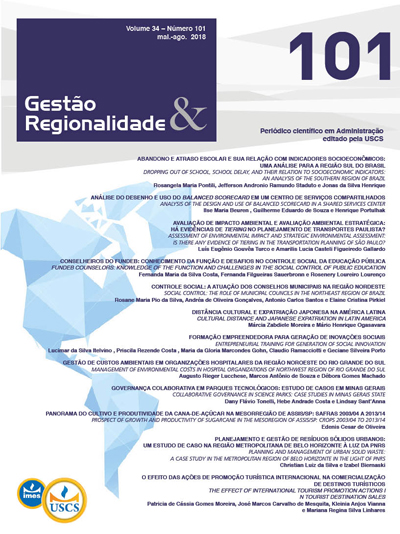DROPPING OUT OF SCHOOL, SCHOOL DELAY, AND THEIR RELATION TO SOCIOECONOMIC INDICATORS: AN ANALYSIS OF THE SOUTHERN REGION OF BRAZIL
DOI:
https://doi.org/10.13037/gr.vol34n101.4173Abstract
The main objective of this article is to analyze the distribution and spatial correlation of the proportion of both the teenagers who dropped out of school as well as teenage students in a situation of school delay, with relation to some socio-economic indicators of cities in the South region of Brazil. To this end, Statistical Analysis of Spatial Data was used. The results showed that social and economic indicators affect drop outs and school delay, due to a significant neighborhood effect. It was considered, therefore, that the final decision of adolescents and their families with respect to staying in school and the dedication to studies is influenced by a set of economic and social factors linked to each other. It was concluded that actions directed towards stimulating employment and economic activity, especially in the regions where the indicators were negative, assist in stimulating the educational level of adolescents.
Keywords: school dropout and delay; socioeconomic indicators; spatial analysis; cities in the South region of Brazil.
Downloads
Downloads
Published
How to Cite
Issue
Section
License
Autores que publicam nesta revista concordam com os seguintes termos:
- Autores mantém os direitos autorais e concedem à revista o direito de primeira publicação, com o trabalho simultaneamente licenciado sob a https://creativecommons.org/
licenses/by-nc-nd/4.0/ , permitindo o compartilhamento do trabalho com reconhecimento da autoria do trabalho e publicação inicial nesta revista. - Autores têm autorização para assumir contratos adicionais separadamente, para distribuição não-exclusiva da versão do trabalho publicada nesta revista (ex.: publicar em repositório institucional ou como capítulo de livro), com reconhecimento de autoria e publicação inicial nesta revista.
- Autores têm permissão e são estimulados a publicar e distribuir seu trabalho online (ex.: em repositórios institucionais ou na sua página pessoal) a qualquer ponto antes ou durante o processo editorial, já que isso pode gerar alterações produtivas, bem como aumentar o impacto e a citação do trabalho publicado (Veja O Efeito do Acesso Livre).
























